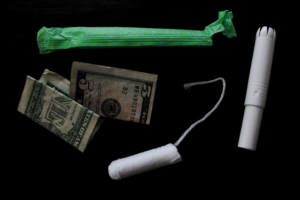Period Poverty in Global Terms

Period poverty is an umbrella term that refers to the inaccessibility of feminine hygiene products, education, washing facilities and waste management, especially for menstruators with low incomes. Menstruators who lack the education or access to resources for safe period management often resort to risky methods such as using rags and clothing, which can lead to bacterial infections that can cause further physical health risks.
Today, there are over 800 million women and girls that have periods every day, yet they still face difficulties to properly manage their menstruation. According to UNICEF, 2.3 billion people across the globe live without basic sanitation services in developing countries. Meanwhile, 73% of people lack access to proper handwashing facilities at home.
COVID-19 affects menstrual health and hygiene by exacerbating pre-existing inequalities regarding period poverty worldwide.
COVID-19 and Period Poverty
As stated by Rose Caldwell, chief executive of Plan International U.K., “the virus is making the situation worse. We already know that the coronavirus outbreak is having a devastating impact on family finances all over the world, but now we see that girls and women are also facing widespread shortages and price hikes on period products, with the result that many are being forced to make do with whatever they can find to manage their period.”
The disruption of global supply chains and ceased trading of smaller-scale private sector enterprises has led to product shortages. This shortage is the primary issue affecting women’s access to safe sanitary products. The price of sanitary products has also increased during the pandemic. It is extremely hard for families to afford these products since the pandemic has also affected household incomes.
“As most shops have run out, I sometimes have to substitute in different ways instead,” said a teenage girl from the Solomon Islands.
“Prices went up as soon as there was a confirmed case of COVID19 in Fiji. Sometimes I have to forgo buying hygiene products as money will have to be used on food and bills,” said a young woman in Fiji.
Stigmatization of Menstruation
Most of the world stigmatizes menstruation. Social stigmas and taboos about menstruation is another key factor that prevents women and girls from properly managing their periods. In Nepal, people perceive menstruating women as impure. Their community expels them to huts for the duration of their cycles. In Uganda, non-governmental agency WoMena showed that many girls skip school when they are on their periods. The primary reason: to avoid teasing from classmates.
Since the rise of COVID-19, some people have associated menstruation as a sign of illness. Although having periods is normal and healthy, there are myths stating that menstruation is a symptom of the coronavirus and that menstruators have a higher chance of infecting others. These myths are badly affecting period poverty by increasing the stigma of menstruation. The negative perceptions of menstruation, such that it is a symptom of an illness and that it should be something to hide from others, should change in order to stop period poverty.
A young woman from the Solomon Islands said “Sometimes [I feel shame]. Especially when I am not able to clean myself during water cuts. I feel embarrassed to walk around my family.”
Organizations Making a Difference
I Support The Girls is an organization that collects and distributes bras and menstruation products to people who need them around the globe. The organization mentioned that it has seen a 35% increase in requests for menstrual products, bras and underwear since the outbreak of the virus. In response, the organization collected and distributed over 2,000,000 products, partnered up with businesses to distribute surplus inventory, and more.
Plan International U.K. is another organization that fights period poverty; it distributes menstrual hygiene kits to support women and girls disproportionately affected by the pandemic.
– Alison Choi
Photo: Unsplash
